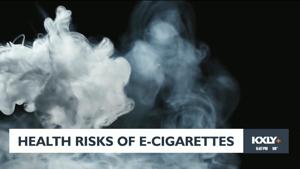COEUR D’ALENE, Idaho — A recent study led by Johns Hopkins Medicine shows that e-cigarettes significantly increase users’ risk of chronic obstructive pulmonary disease (COPD) and high blood pressure.
Local doctors report treating young patients with severe breathing problems from vaping.
When e-cigarettes first became available, companies marketed them as a “safe” alternative to traditional cigarettes. The different flavors made them appealing to teenagers and young adults.
“Now you have products that taste pretty good, don’t have a big smell. And the reality is that that’s kind of a deceitful way to get a product into the hands of someone that later may start to smoke,” said Dr. Todd Hoopman, a pulmonologist at Kootenai Health.
Dr. Robert Eagle, a pediatrician with Providence, shares these concerns about marketing to young people.
“Smoking a bubble gum flavored vape in the bathroom might sound intriguing when you’re 12, 13, 14 years old, but it’s going to have negative implications down the road,” Eagle said.
This is because E-cigarettes and vapes still contain nicotine, which creates dependency risks.
“I think that the risk of developing that dependency on the nicotine containing products, which include vapes, is there and, you know, there’s lifelong health implications that can develop down the road,” Eagle said.
Dr. Hoopman has seen severe breathing complications from vaping.
“We’re seeing patients who become extremely ill from a pulmonary standpoint with acute respiratory illnesses, respiratory failure, need for intubation, mechanical ventilation, life support from e-cigarettes,” Hoopman said.
This summer, he treated a young patient who needed intensive care because of lung damage from e-cigarette use.
“The water vapor that comes out of the e-cigarettes is definitely shown to have significant potential consequences for people with regards to lung damage, life threatening respiratory illnesses and respiratory failure in some cases,” Hoopman said.
Doctors recommend that parents talk to their children about the risks. Dr. Eagle encourages families to have direct conversations.
“Prophylactically have those conversations with their teens and other loved ones in their family that that’s not something that they should try and give it that kind of negative connotation,” Eagle said.
Dr. Hoopman agrees but believes more action is needed at the federal level.
“Restricting access in all of the ways that we’ve restricted access to other dangerous products becomes paramount,” Hoopman said.
He also wants better education at state and local levels.
Both doctors say e-cigarettes are not safe products. Dr. Hoopman uses an analogy about misleading marketing.
“You may get down the road, but later, when you make a turn, you’re going to tip, crash and be in trouble,” Hoopman said.
The Johns Hopkins study adds to evidence that contradicts early claims about e-cigarettes being safe alternatives to traditional smoking.
COPYRIGHT 2025 BY KXLY. ALL RIGHTS RESERVED. THIS MATERIAL MAY NOT BE PUBLISHED, BROADCAST, REWRITTEN OR REDISTRIBUTED.
